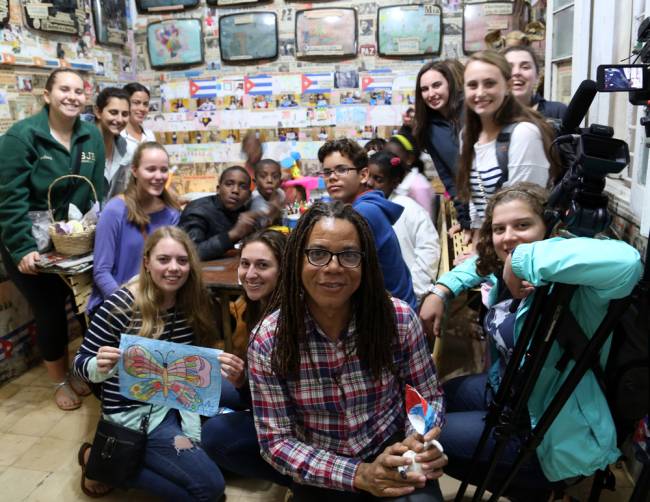
Washington Township film students find Cuba’s story in its people
After filming and interviewing Cuban artist Lazaro Salsita in his Havana home, documentary students from Immaculate Heart Academy walked over to children doing artwork at a table the artist had set up to encourage artistic expression in youths.
The small front room of the home had become a studio of sorts, with images covering every inch of wall — colored stars, flowers, Cuban flags and houses. The documentary students were struck by their attention to detail and love of country. And after questioning the children — and fielding retorts such as “do you know One Direction?” — the documentary’s working theme suddenly shifted.
What was once a documentary that was going to focus on the political and economic conditions of Cuba has suddenly become much more.
“This was a man taking everything he had, which wasn’t a lot, to help his community; it was so human,” said Stephanie Brodeur, the assistant principal of academics and technology at Immaculate Heart. “We went in there thinking we were going to do some cerebral documentary, but the everyday people of Cuba are the ones who are really going to change their society. We realized some of our footage was really golden, because we have insights and interviews from a perspective that we don’t really have access to in the United States.”
On Feb. 15, the documentary and field production class had flown to Havana to begin an eight-day trip in which the 10 students intended to interview officials and locals about the political climate of the country in light of President Obama’s efforts to normalize relations between it and the United States.
After spending months of planning, filling out the required documentation and eventually being interrogated by officials in both countries, they said everything changed when they landed.
As they spoke to different people of all walks of life, the students said they realized their preconceived stereotypes of Cuban society were unfounded, and they wanted to convey that on film.
“Our class’s goal with all of the footage we shot is to create the message that life in Cuba is not as it seems,” said Sydney Wall, a 16-year-old student in the class. “Yes the effects of communism are present, and poverty is evident in some places, but the people are not starving; they work for a living and are happy. We learned so much from their outlook on life, and we want to share that with our community.”
The class interviewed locals in between speaking with professors and researchers at the University of Havana, health care professionals at La Escuela Latinoamericana de Medicina and other places throughout the country. After hours of interviewing during the day, the interviews and b-roll would be edited and cut by rotating members of the class at night.
The students said they will use the embargo and political climate as a frame for the documentary, but it will all narrow down and focus on modern-day life and cultural similarities between the United States and Cuba.
“With the current news surrounding relations between the United States and Cuba, it was fairly obvious to us what our documentary should focus on,” Nicole Christopoul, an 18-year-old in the class said. “Once in Cuba, however, we realized that there was a lot more to our interviews and discussions.”
Others in the class said they hoped their documentary would help break down stereotypes the audience had, much like what happened with the class itself.
“We decided to go with life in Cuba because everyone in America has stereotypes of Cuba and Cuban people,” said Cortney Muller, a 16-year-old student. “We wanted to see what [Cuba] was really like. So we focused on art, culture and music.”
The documentary and field production class said it plans to finish the film by May — and could possibly enter it in high school film festivals.
“Yes, this trip was educational, and of course gave me a one-of-a-kind experience in the communications field. But I think that it taught me more about life than anything else,” said Alara Siegel, 16. “Cuba is a country not many Americans know much about, and getting to experience it hands-on, and document it on camera, was incredible.”
(From: North Jersey)

